Deck 23: The Chemistry of Amines
Question
Question
Question
Question
Question
Question
Question
Question
Question
Question
Question
Question
Question
Question
Question
Question
Question
Question
Question
Question
Question
Question
Question
Question
Question

Unlock Deck
Sign up to unlock the cards in this deck!
Unlock Deck
Unlock Deck
1/25
Play
Full screen (f)
Deck 23: The Chemistry of Amines
1
Name the amine CH3CH2NHCH2CH3 using its common and IUPAC name, then classify the amine as primary, secondary, or tertiary.
The amine has the common name diethylamine. The IUPAC name is N-ethylethanamine. It is a secondary amine.
2
Name the amine using its common and IUPAC name, then classify the amine as primary, secondary, or tertiary.


The common name is N,N-dimethylpropylamine. The IUPAC name is N,N-dimethylpropan-1-amine. The amine is a tertiary amine.
3
Draw the structure of 3,5-diethylaniline, then classify the amine as primary, secondary, or tertiary.
An aniline is a benzene ring with a primary amine substituent. Add the ethyl groups to carbons 3 and 5.


4
An amine is considered a principal group for nomenclature in multifunctional compounds. How does it compare with the other principal groups?
A) The amine has higher priority than a carboxylic acid.
B) The amine has higher priority than an aldehyde.
C) The amine has higher priority than an alcohol.
D) None of the other choices.
A) The amine has higher priority than a carboxylic acid.
B) The amine has higher priority than an aldehyde.
C) The amine has higher priority than an alcohol.
D) None of the other choices.

Unlock Deck
Unlock for access to all 25 flashcards in this deck.
Unlock Deck
k this deck
5
Can this amine be resolved into enantiomers at room temperature? Explain why or why not.



Unlock Deck
Unlock for access to all 25 flashcards in this deck.
Unlock Deck
k this deck
6
Identify the compound with the highest boiling point.
A) CH3CH2CH2CH2NH2
B) CH3CH2CH2CH2OH
C) CH3CH2CH2CH2CH3
D) CH3CH2OCH2CH3
A) CH3CH2CH2CH2NH2
B) CH3CH2CH2CH2OH
C) CH3CH2CH2CH2CH3
D) CH3CH2OCH2CH3

Unlock Deck
Unlock for access to all 25 flashcards in this deck.
Unlock Deck
k this deck
7
Draw a structure with the molecular formula C5H9N, which is a chiral primary amine with no triple bonds. (There is more than one correct answer.)

Unlock Deck
Unlock for access to all 25 flashcards in this deck.
Unlock Deck
k this deck
8
Propose a structure for a compound with the molecular formula C5H11N that has the NMR spectra:
1H NMR 1.28 (s, 6H), 1.58 (s, 2H), 4.91 (dd, 1H), 5.20 (dd, 1H), 5.54 (dd, 1H) ppm
13C NMR 32.7, 52.7, 111.2, 145.4
1H NMR 1.28 (s, 6H), 1.58 (s, 2H), 4.91 (dd, 1H), 5.20 (dd, 1H), 5.54 (dd, 1H) ppm
13C NMR 32.7, 52.7, 111.2, 145.4

Unlock Deck
Unlock for access to all 25 flashcards in this deck.
Unlock Deck
k this deck
9
A student has produced the two isomers, A and B, and wants to use infrared (IR), 1H, and 13C NMR to distinguish between them. Identify what features in each spectroscopy method the student can quickly use to conclusively identify which isomer is which.
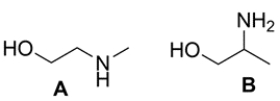


Unlock Deck
Unlock for access to all 25 flashcards in this deck.
Unlock Deck
k this deck
10
Rank the amines from most basic to least basic.

A) A > B > C
B) C > B > A
C) C > A > B
D) B > A > C

A) A > B > C
B) C > B > A
C) C > A > B
D) B > A > C

Unlock Deck
Unlock for access to all 25 flashcards in this deck.
Unlock Deck
k this deck
11
A student is hydrolyzing the amide below, and the reaction did not go to completion. The student wants to isolate just the neutral amine product. Design a separation and isolation method based on the basicities of all three compounds.



Unlock Deck
Unlock for access to all 25 flashcards in this deck.
Unlock Deck
k this deck
12
Give the structure of the nucleophile that would react with CH3I to give triethylmethylphosphonium iodide. Show any unshared electron pairs and charges, where applicable.
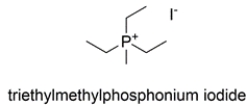


Unlock Deck
Unlock for access to all 25 flashcards in this deck.
Unlock Deck
k this deck
13
Provide the major organic product for the reaction. If you believe no product will be formed, explain why.



Unlock Deck
Unlock for access to all 25 flashcards in this deck.
Unlock Deck
k this deck
14
Deduce the structure of the starting material for the reaction.
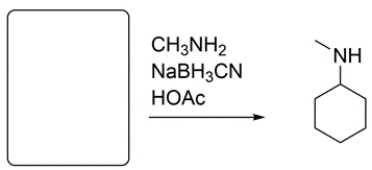


Unlock Deck
Unlock for access to all 25 flashcards in this deck.
Unlock Deck
k this deck
15
Determine the starting materials that could be used in two synthetic routes to make the amine by reductive amination.
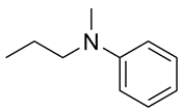


Unlock Deck
Unlock for access to all 25 flashcards in this deck.
Unlock Deck
k this deck
16
Predict the major organic product for the reaction. If you believe no reaction will occur, write NR and explain why.



Unlock Deck
Unlock for access to all 25 flashcards in this deck.
Unlock Deck
k this deck
17
An unknown compound with the molecular formula C15H23N is treated with excess CH3I and heat, followed by Ag2O to give these two products. Deduce the structure of the unknown compound.
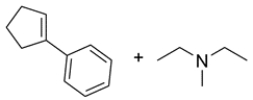


Unlock Deck
Unlock for access to all 25 flashcards in this deck.
Unlock Deck
k this deck
18
Outline a synthesis for the preparation of 4-aminobenzenesulfonate from aniline.
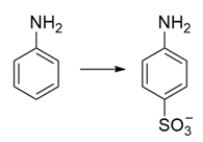


Unlock Deck
Unlock for access to all 25 flashcards in this deck.
Unlock Deck
k this deck
19
Outline a synthesis of 1,3,5-trimethylbenzene from 2,4,6-trimethylaniline.



Unlock Deck
Unlock for access to all 25 flashcards in this deck.
Unlock Deck
k this deck
20
Identify the reagents needed for this synthetic sequence.



Unlock Deck
Unlock for access to all 25 flashcards in this deck.
Unlock Deck
k this deck
21
Aryldiazonium salts cannot be directly converted to
A) Ph-X, where X is a halide.
B) Ph-CN.
C) Ph-OH.
D) Ph-CH3.
A) Ph-X, where X is a halide.
B) Ph-CN.
C) Ph-OH.
D) Ph-CH3.

Unlock Deck
Unlock for access to all 25 flashcards in this deck.
Unlock Deck
k this deck
22
Deduce the structures of the aniline and phenol that are used to produce this azo dye.
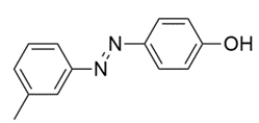


Unlock Deck
Unlock for access to all 25 flashcards in this deck.
Unlock Deck
k this deck
23
Predict the major organic product for the two reactions. If no reaction occurs, write NR and explain why.
a.

b.

a.

b.


Unlock Deck
Unlock for access to all 25 flashcards in this deck.
Unlock Deck
k this deck
24
A student wants to make this amine using either the Gabriel synthesis or the Staudinger reaction. Will either method work? If so, deduce the structures of the starting materials. If not, explain why.



Unlock Deck
Unlock for access to all 25 flashcards in this deck.
Unlock Deck
k this deck
25
Cyclohexanecarbonyl chloride is converted to cyclohexanamine by this reaction. The major product formed in step 1 is an isocyanate. Draw the isocyanate and a curved-arrow mechanism showing how it is formed.
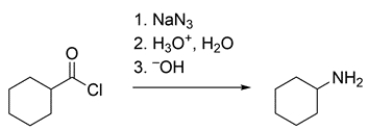


Unlock Deck
Unlock for access to all 25 flashcards in this deck.
Unlock Deck
k this deck


